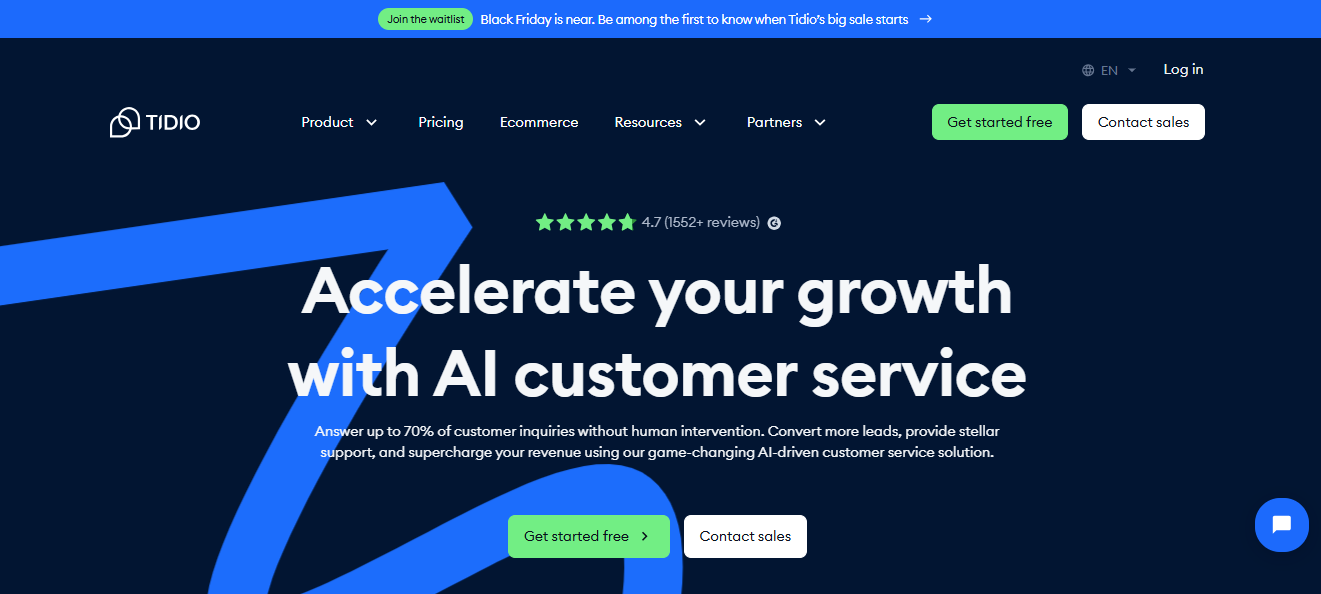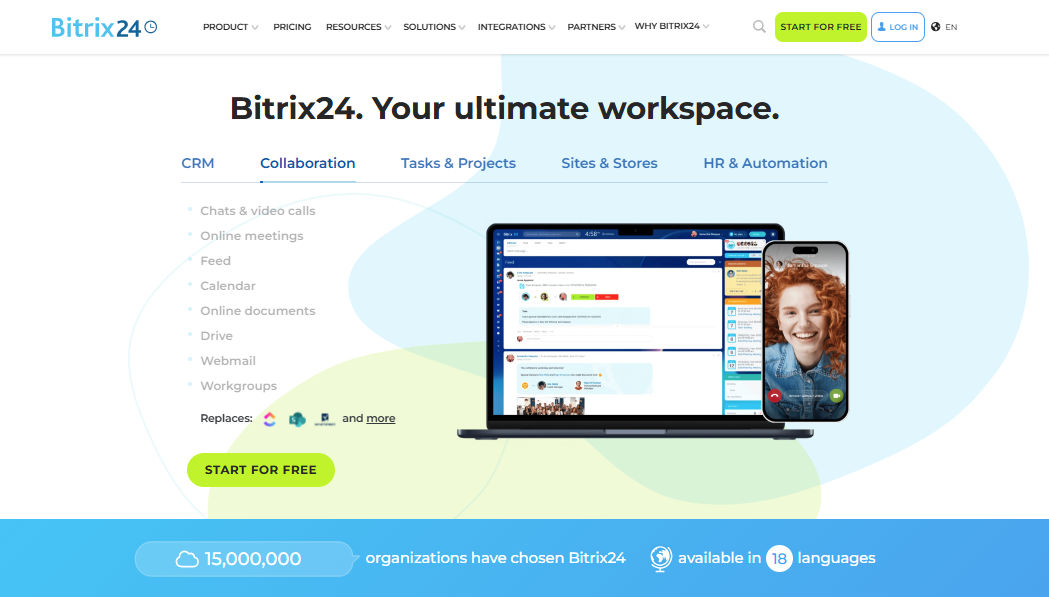10 Best Customer Service Software for small businesses
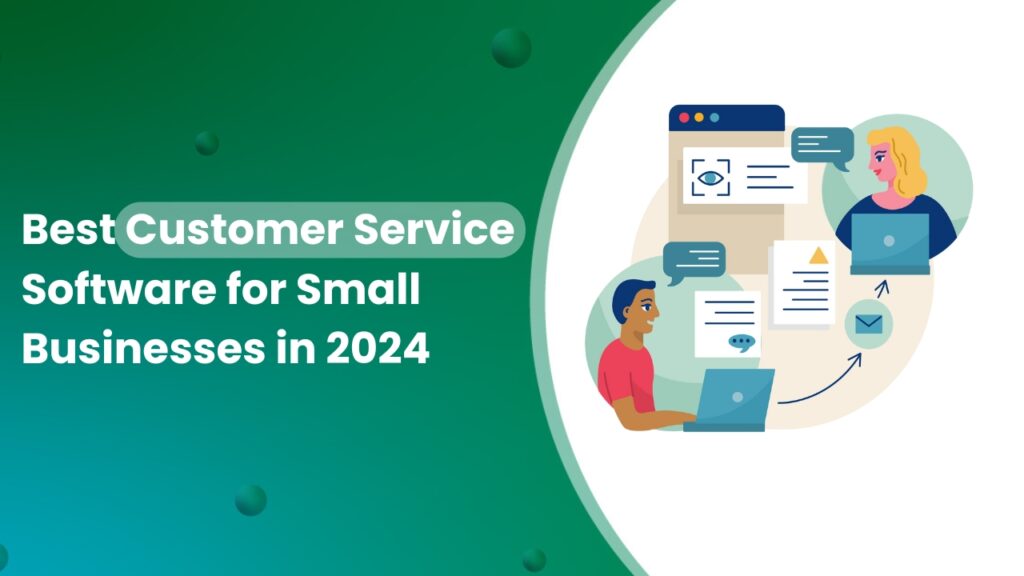
Running a small business is no small feat. You’re juggling multiple responsibilities, from managing operations to marketing your products or services. But one area you can’t afford to overlook is customer service. Happy customers are the backbone of any successful business, and providing excellent support can set you apart from competitors. However, as a small business, you likely don’t have the resources for a large customer service team. That’s where customer service software comes in. These tools help you streamline support, automate tasks, and deliver exceptional service without breaking the bank.
In this blog, we’ll explore the 10 best customer service software solutions for small businesses in 2025. Whether you’re looking for affordable options, easy-to-use tools, or powerful features, this list has something for everyone.
😎 Let’s get started!
What is Customer Service Software?
Customer service software is a tool that helps businesses manage and improve their interactions with customers. It’s designed to make life easier for both your customers and your support team. This software can handle things like:
- Managing customer inquiries
- Tracking support tickets
- Providing self-service options for customers
- Analyzing customer feedback
designed to enhance the overall customer experience by providing consistent and timely support.
Why is Customer Service Software Important for Businesses?
You might be wondering, “Do I really need customer service software for my small business?” The short answer is yes, and here’s why:
- Happy Customers, Healthy Business: Good customer service leads to satisfied customers, who are more likely to stick around and recommend your business to others.
- Efficiency is Key: These tools help your team work faster and smarter, handling more customer issues in less time.
- Stay Organized: Keep all customer interactions in one place, making it easier to track and resolve issues.
- Learn and Improve: Many software options offer analytics, helping you understand your customers better and improve your service.
- Available 24/7: Some software can provide round-the-clock support through chat bots or self-service options, even when your team is off the clock.
- Cost-Effective: In the long run, good customer service software can save you money by streamlining processes and reducing the need for a large support team.
Types of Customer Service Software
Not all customer service software is created equal. Here are the main types you’ll come across:
Help Desk Software: Manages customer inquiries through a ticketing system, often with email support and automation features.
Live Chat Software: Enables real-time communication with customers via chat, enhancing immediate support and engagement.
Knowledge Base Software: Offers self-service options through FAQs, articles, and guides, reducing the volume of support requests.
Customer Relationship Management (CRM): Primarily manages customer relationships and sales, but many CRMs include customer service modules.
Social Media Customer Service Software: Helps businesses manage and respond to customer inquiries on social media platforms.
Key Features of Customer Service Software
When shopping for customer service software, keep an eye out for these important features:
- Ticket Management: The ability to create, assign, and track support tickets.
- Multi-channel Support: Can handle inquiries from various channels like email, chat, phone, and social media.
- Self-Service Options: Provides resources for customers to find answers on their own, like FAQs or knowledge bases.
- Reporting and Analytics: Offers insights into your customer service performance.
- Integration Capabilities: Can work well with other tools you’re already using, like your CRM or email marketing software.
- Automation Features: Helps streamline repetitive tasks and responses.
- Customization Options: Allows you to tailor the software to fit your specific needs.
Now that we’ve covered the basics, let’s dive into our top picks for the best customer service software for small businesses in 2024.
10 Best Customer Service Software for Small Businesses in 2024
1. Salestown CRM
Introduction: Salestown CRM is a versatile customer relationship management tool that integrates customer service features seamlessly. It’s designed to help businesses manage customer interactions and improve customer satisfaction.
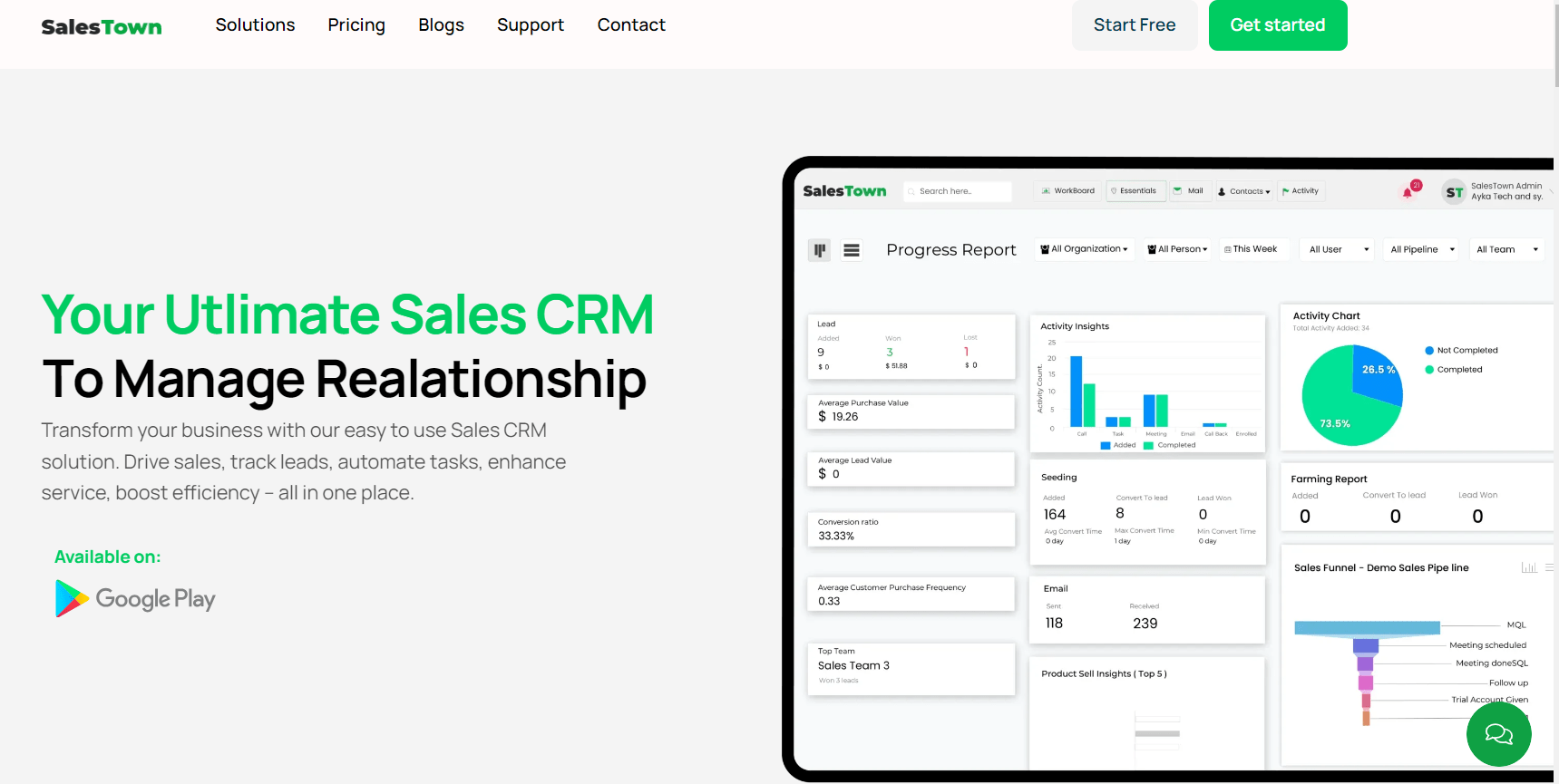
Key Features:
- Ticket Management: Organize and track customer inquiries efficiently.
- Multi-Channel Support: Handle customer interactions across email, chat, and social media.
- Automation: Automate routine tasks like follow-up emails and ticket assignments.
- Analytics and Reporting: Gain insights into customer service performance.
- Integration: Easily integrates with other platforms like websites, social media, ads campaign, online portal etc.
Pros:
- User-friendly interface
- Comprehensive customer service and CRM features
- Scalable as your business grows
Cons:
- May lack some advanced features compared to specialized customer service platforms
- Limited customization options
Final Thought: Salestown is a great all-in-one CRM Software for small businesses looking to integrate customer service with CRM capabilities.
2. Salesforce Service Cloud
Introduction: Salesforce Service Cloud is a leading customer service platform, known for its powerful features and integration capabilities. It’s part of the Salesforce ecosystem, making it ideal for businesses already using Salesforce CRM.
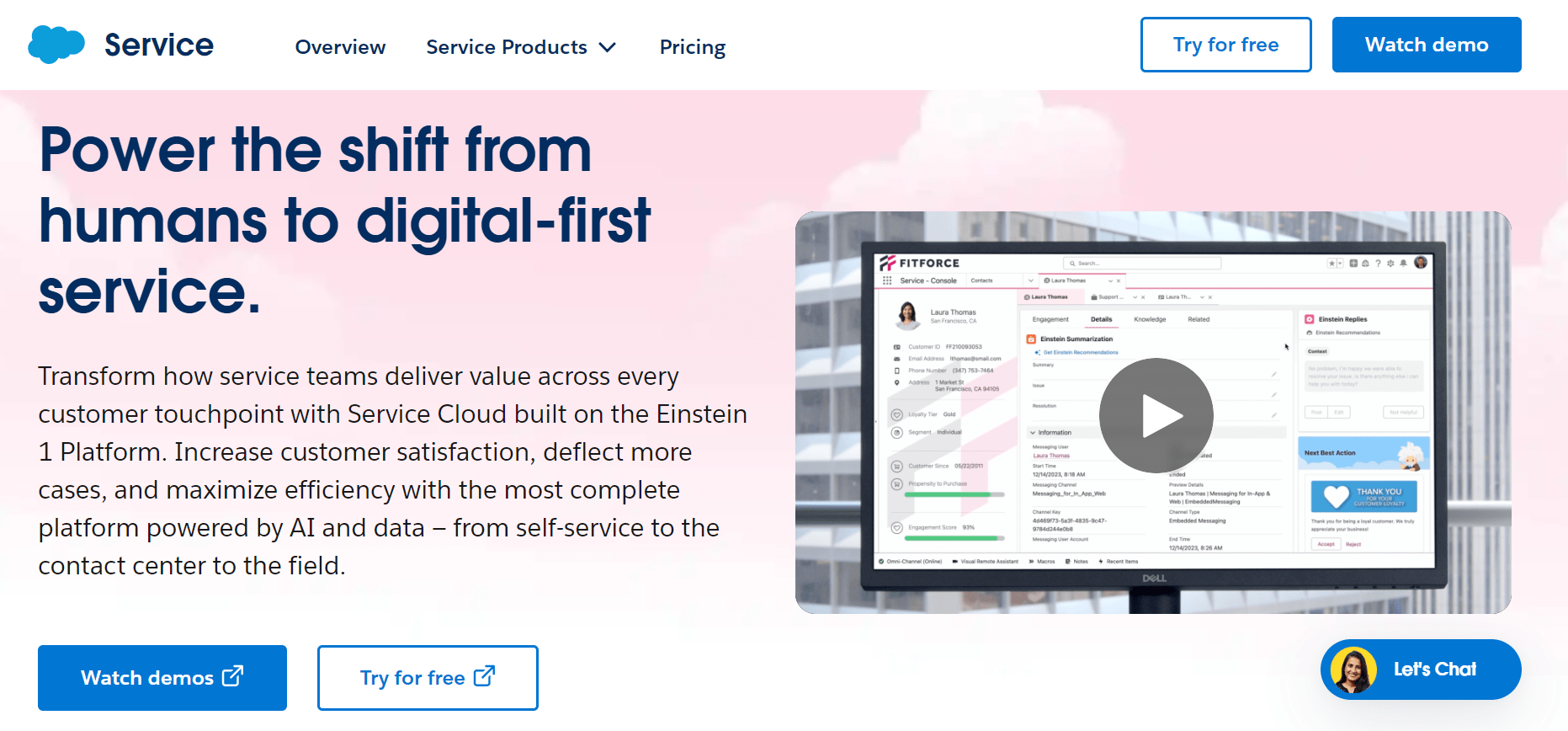
Key Features:
- Omni-Channel Support: Manage interactions across multiple channels, including email, phone, chat, and social media.
- AI-Powered Tools: Utilize AI for automated responses and predictive analytics.
- Customizable Dashboards: Create tailored dashboards to monitor key metrics.
- Knowledge Base: Provide self-service options with a comprehensive knowledge base.
- Integration: Integrates seamlessly with other Salesforce products and third-party tools.
Pros:
- Highly customizable
- Robust feature set
- Strong support and community
Cons:
- Expensive, especially for small businesses
- Can be complex to set up and manage
Final Thought: Salesforce Service Cloud is ideal for businesses needing a comprehensive and scalable solution, especially those already invested in the Salesforce ecosystem.
3. Freshdesk
Introduction: Freshdesk is a cloud-based customer service software known for its intuitive design and affordability. It caters to businesses of all sizes but is particularly popular among small businesses.
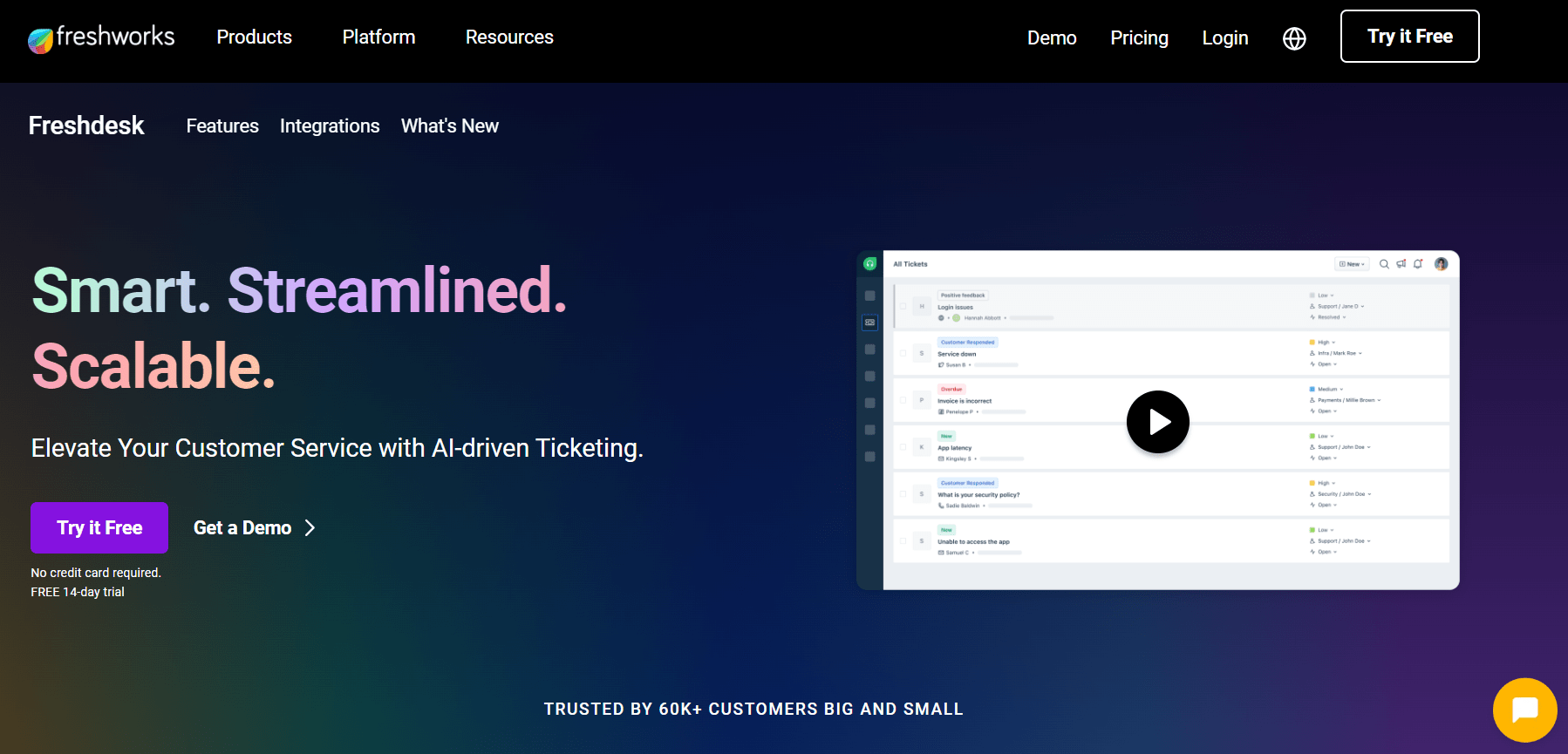
Key Features:
- Ticketing System: Efficiently manage customer inquiries and support tickets.
- Multi-Channel Support: Supports email, chat, phone, and social media.
- Automation: Automate workflows and routine tasks.
- Knowledge Base: Create a self-service portal for customers.
- Collaboration Tools: Facilitate teamwork with internal collaboration features.
Pros:
- Easy to use
- Affordable pricing with a free tier available
- Good integration options
Cons:
- Reporting features are somewhat basic
- May lack advanced functionalities needed by larger businesses
Final Thought: Freshdesk is an excellent choice for small businesses looking for a user-friendly and cost-effective customer service solution.
4. Zendesk
Introduction: Zendesk is a widely-used customer service platform offering a broad range of tools to manage customer interactions. It’s known for its scalability and extensive feature set.
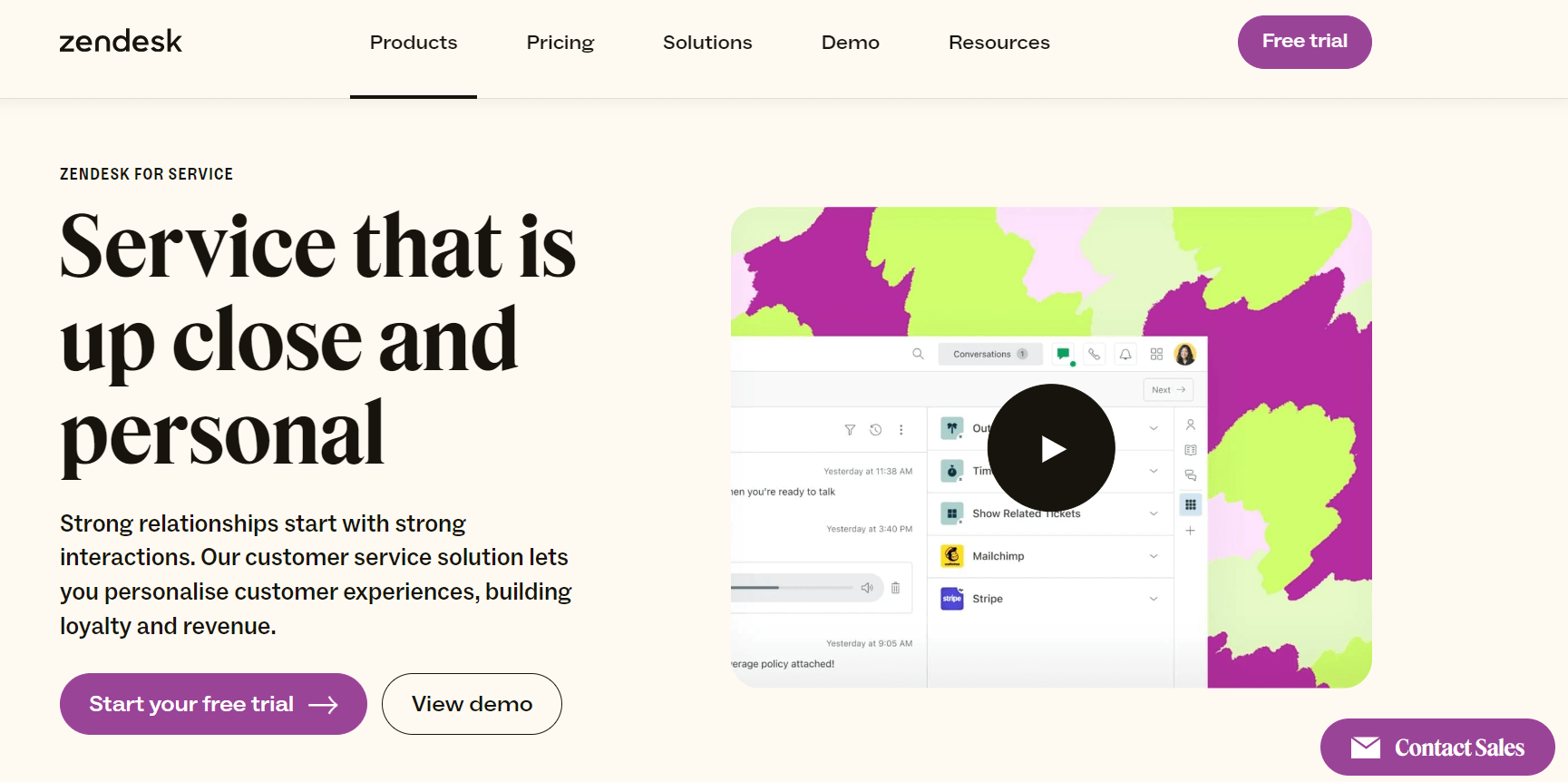
Key Features:
- Ticketing System: Comprehensive system to manage and prioritize customer issues.
- Live Chat and Messaging: Engage with customers in real-time.
- Automation: Automate routine tasks and workflows.
- Analytics and Reporting: Deep insights into customer service performance.
- Multi-Channel Support: Unified platform for email, chat, phone, and social media.
Pros:
- Highly scalable
- Extensive customization and integration options
- Strong analytics capabilities
Cons:
- Can be costly, especially for advanced features
- Steeper learning curve for beginners
Final Thought: Zendesk is ideal for businesses that need a robust and scalable solution capable of handling complex customer service needs.
5. HubSpot Service Hub
Introduction: HubSpot Service Hub is part of the HubSpot ecosystem, known for its seamless integration with HubSpot’s CRM, marketing, and sales tools. It’s designed to help businesses deliver better customer service through integrated solutions.
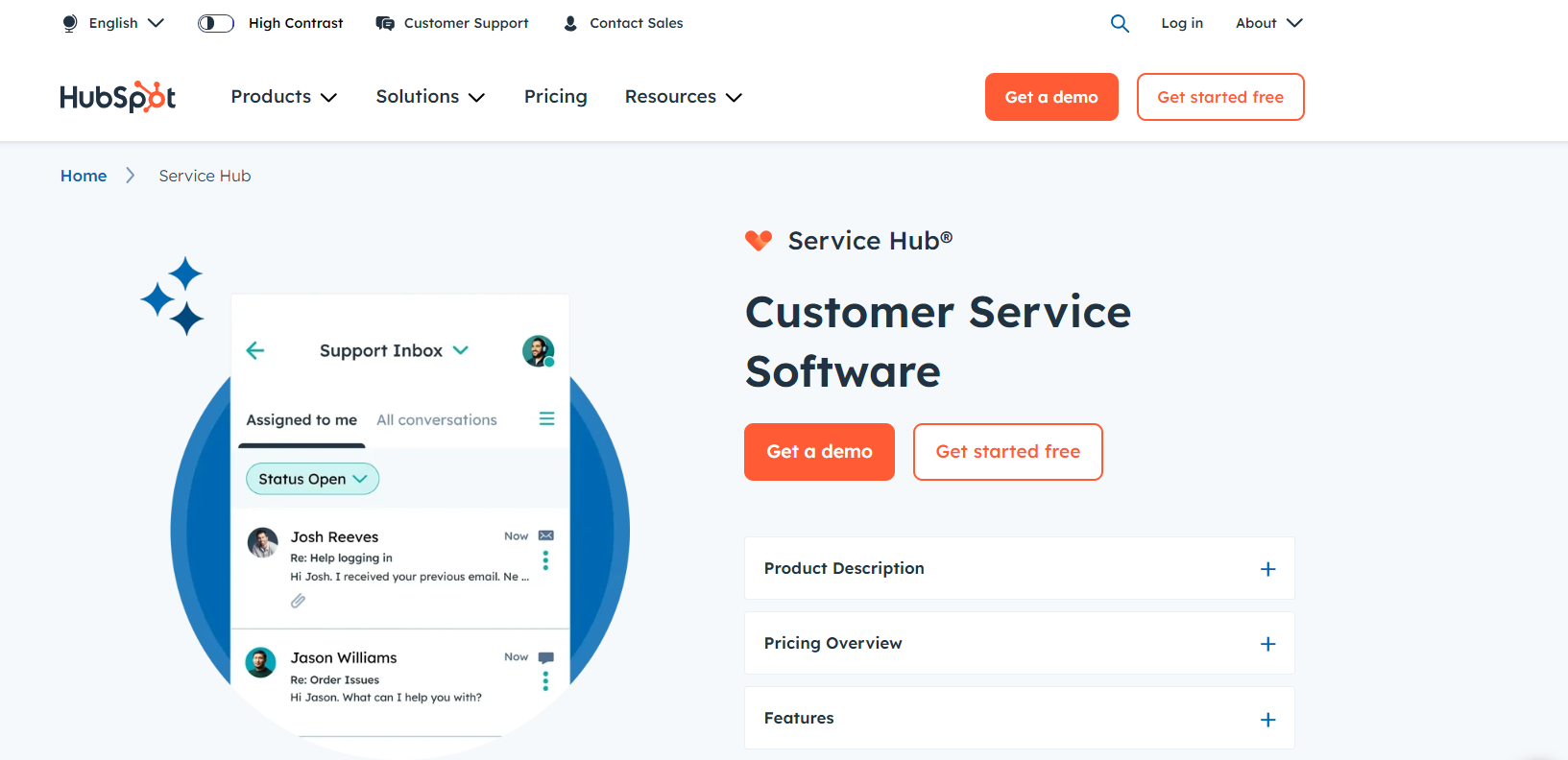
Key Features:
- Ticketing System: Organize and manage customer support tickets.
- Knowledge Base: Create self-service options for customers.
- Customer Feedback: Collect and analyze customer feedback to improve service.
- Live Chat and Bots: Engage with customers in real-time and automate responses.
- Integration: Integrates well with HubSpot’s CRM and other tools.
Pros:
- User-friendly and easy to set up
- Free tier available
- Strong integration with HubSpot tools
Cons:
- Limited features in the free tier
- Can become expensive with additional features
Final Thought: HubSpot Service Hub is perfect for businesses already using HubSpot, offering seamless integration and a comprehensive set of features.
6. Intercom
Introduction: Intercom is a modern customer service platform focusing on live chat, messaging, and automation to enhance customer engagement. It’s designed to help businesses connect with customers in real time.
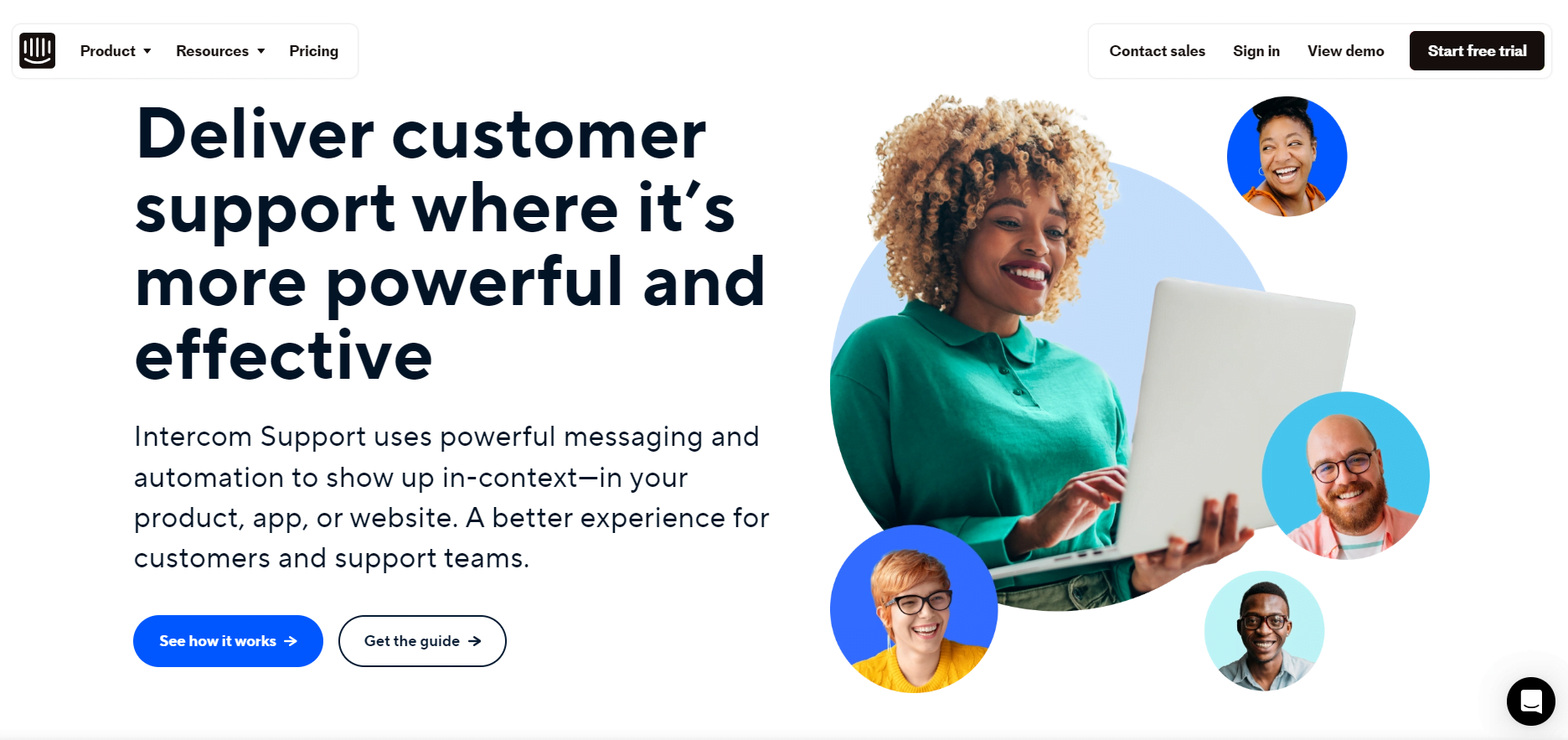
Key Features:
- Live Chat and Messaging: Real-time communication with customers.
- Automated Bots: Use bots to handle routine queries and tasks.
- Customer Segmentation: Segment customers based on behavior and interactions.
- In-App Messaging: Engage users within your app or website.
- Analytics and Reporting: Track performance and customer engagement.
Pros:
- Excellent for real-time engagement
- User-friendly and modern interface
- Strong automation features
Cons:
- Expensive, especially for smaller businesses
- May lack traditional support features like ticketing
Final Thought: Intercom is ideal for businesses prioritizing real-time communication and customer engagement, though it may not be comprehensive enough for all needs.
7. Zoho Desk
Introduction: Zoho Desk is a feature-rich customer service software that’s part of the Zoho suite. It offers a variety of tools for managing customer support, making it a popular choice among small businesses.
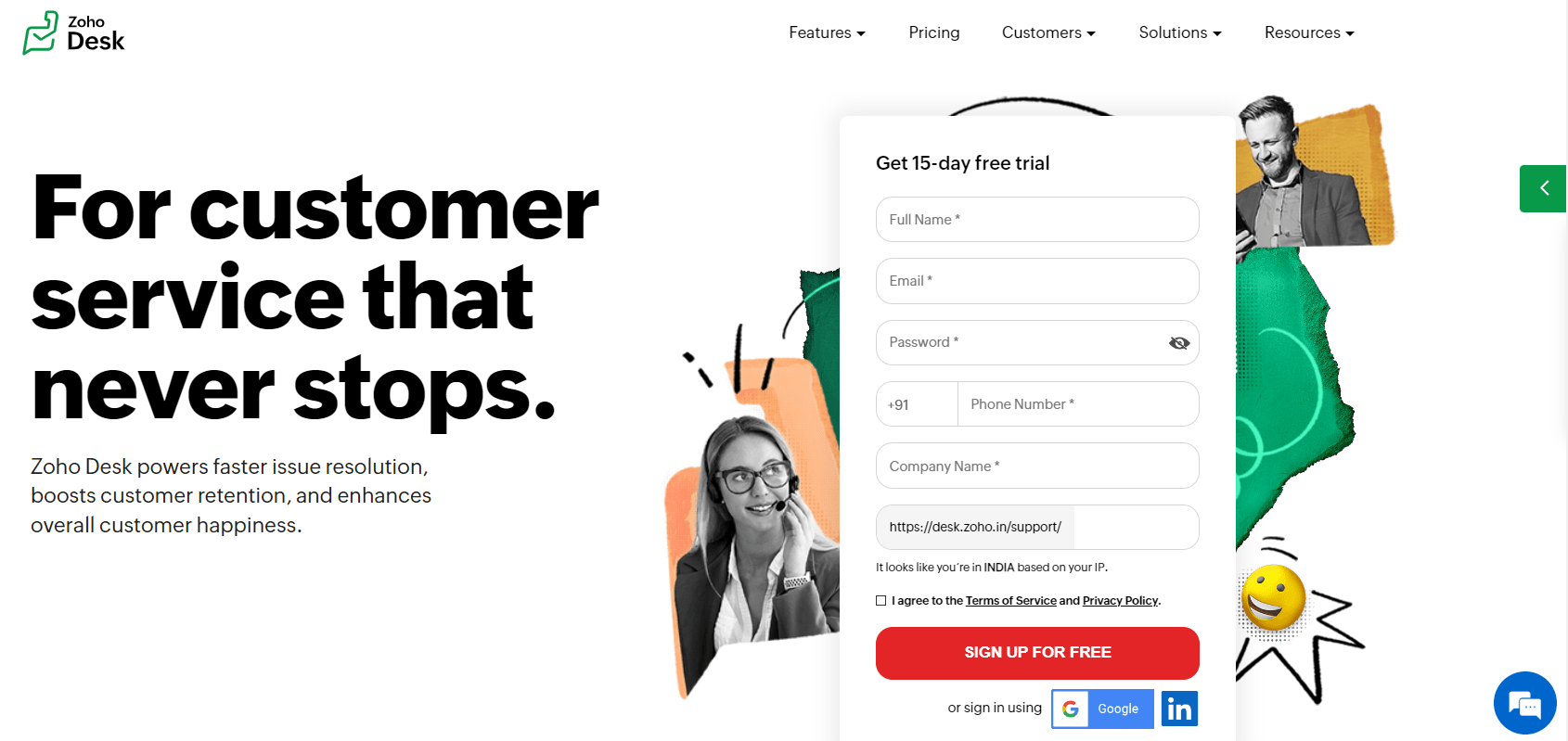
Key Features:
- Ticketing System: Manage and prioritize customer support tickets.
- Multi-Channel Support: Handle interactions via email, chat, phone, and social media.
- Automation: Automate tasks and workflows for efficiency.
- AI-Powered Features: Utilize AI for chatbots and predictive analytics.
- Integration: Integrates well with other Zoho products and third-party apps.
Pros:
- Cost-effective
- Good integration within the Zoho ecosystem
- Flexible and customizable
Cons:
- Can be complex to set up
- Limited third-party integrations compared to competitors
Final Thought: Zoho Desk offers a comprehensive and affordable solution, particularly well-suited for businesses already using other Zoho products.
8. Front
Introduction: Front is a modern customer communication platform that blends email, messaging, and collaboration into one unified inbox. It’s designed to streamline team workflows and enhance customer interactions, making it a great choice for businesses focused on efficiency.

Key Features:
- Shared Inbox: Collaborate on customer emails and messages in one place.
- Multi-Channel Support: Manage conversations across email, SMS, chat, and social media.
- Automation & Rules: Automate workflows to improve response times.
- Integrations: Connect with popular tools like CRM, Slack, and project management apps.
- Analytics & Reporting: Gain insights into team performance and customer interactions.
Pros:
- Easy-to-use interface
- Strong collaboration features
- Seamless third-party integrations
Cons:
- Pricing can be high for small businesses
- Limited advanced automation compared to competitors
Final Thought:
Front is a powerful tool for teams that want to improve collaboration and customer communication, especially for businesses that rely on email-driven workflows.
Ask these Questions yourself before selecting Customer Service System
- How much can you afford to spend on this tool?
- How many people will be using the software?
- What specific features are must-haves for your business?
- Can the software grow with your business?
- How user-friendly is the platform?
- Will it work well with your existing tools?
- Which channels (email, chat, phone, etc.) are most important for your customers?
Wrap Up
Picking the right customer service software is key for small businesses wanting to simplify their processes and boost customer satisfaction. Each platform has its own set of features and advantages, so it’s important to think about what your business specifically needs and what fits your budget.
If you’re after a user-friendly option that offers strong features without breaking the bank, take a look at Salestown CRM. It not only helps you manage customer interactions but also supports your email marketing efforts.
Book a live demo today to see how Salestown CRM can help your business grow!

